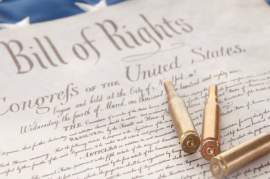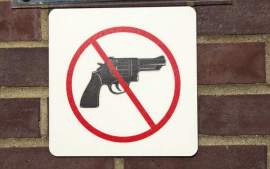
Make Sure You Know Your Gun Control Arguments For and Against

The gun control debate is fueled by opposing sentiments, between those who support gun rights and individuals with anti gun sentiments. The arguments are rooted in different philosophical applications as well as statistics and facts regarding how firearms can impact society.
It is important to keep mind that even though there are strong and valid points to be made for both sides of gun control issues, this has proven to be one of the most debated and intense battles that has been fought on the political forefront. Though minor advances and pitfalls have been taken by both factions, the debate of gun control issues is one that is still deadlocked, and will probably continue to remain stagnant in taking significant steps toward either side of the argument.
At the crux at both arguments are underlying questions as to what is to be ultimately accomplished in choosing either side of the debate. Firstly, how are firearm restrictions to be implemented without violating the Second Amendment of the Constitution is one that is considered central in terms of political and legislative in determining how to approach gun control issues. Secondly, a more recently considered aspect is how gun control limit or restrict crime, if at all.
Empirical evidence and statistical facts have proven valid points for both sides of gun control issues, making it extremely difficult to determine an obvious effect or answer. Lastly, one of the most asked questions is how would the restriction of firearms inhibit or impair a citizen's ability for self defense, and how such a stance is viable without infringing on Second Amendment Rights. The right to bear arms has proven to be somewhat of a thorn in the side of the gun control debate for both sides, but particular those who favor gun control.
Anti gun control factions are unwavering when it comes to interpretations of the Second Amendment that do not coincide word for word as it is written in the Bill of Rights. The National Rifle Association and the Gun Owners of America are two groups that defend the constitutional provision with all of their resources. Gun control activists will often pose three concepts regarding the Second Amendment as it is written:
The provision is outdated and obsolete; furthermore, its ambiguity lends for confusion and different means for interpretations of the provision, and must therefore, be amended to coincide with the times and be more explicit or simply be eradicated.
Regarding the inclusion of "regulated militia," arms are to be kept for the sole purpose of defense of tyranny or militaristic attempt by the government to suppress the people. To that extent, firearms should otherwise be restricted from other uses with few exceptions.
The right to bear arms is not absolute; it should be subject to regulation under certain requirements, such as when the commonwealth may be possibly threatened. This provision does not support the use of military-style weapons--such as semi- and fully automatic weapons--by regular civilians because they are not needed in the realms of self-defense and protection or hunting and recreational use.
Though this interpretation may serve to have applied logic in an organized and well-thought out manner, anti gun control supporters will claim that the violation of the Second Amendment is a reason why such a clause was introduced in the Constitution; for the people to protect themselves from any form of violation of civil liberties and freedoms.
Though the interpretation of the right to bear arms is subject to bias and convenience, the arguments posed by each faction have strong and valid points that must be considered to the full extent in order to understand all of the gun control issues. One of the arguments that is getting the most attention in recent times is gun violence and children or minors.
Whether it would be that children have access to firearms and acquire them with malicious purpose or intention to commit a crime, or simply accidental discharge of a weapon by a small child finding a parents handgun and playing with it, firearms are becoming more of a serious concern in regards to children finding ways to get their hands on them. Events as the Columbine High School and Virginia Tech shooting made this argument become more of a national awareness of the gun violence by young people.
Gun control supporters subsequently rallied to propose more restrictions and laws to further limit the availability of firearms. Anti gun control factions responded by making it a responsibility for parents to educate their families of the dangers of firearms and guns, particularly if they were firearm owners themselves. They claimed that laws and regulations would not bar children from acquiring guns if the education was not there in the first place.
Though certain provisions may be taken, such as storing guns in gun safes or applying trigger locks to the weapons, it is more important to educate people about firearms, especially children. Anti gun control supporters stressed that it is the responsibility of the parents to educate their children about guns, and even go as far as teaching them how to appropriately handle firearms so as the can develop a personal sense of fear and respect for them, ant not regard them as toys.
Another common argument posed by gun control activists is that the government has a duty to society and the people to keep firearms away from those individuals that should never be in possession of firearms. There are already laws in place listing restrictions placed on certain people, such as convicted felons, that prohibit their possession, purchasing, and carrying of firearms. Though these restrictions may infringe on some slight level upon civil liberties, the cost will prove worth the price if guns are kept out of the hands of criminals.
Gun rights supporters will argue that more restrictions placed upon already strict gun laws will simply prove to be useless; criminals will always find other means in obtaining what they want or need, that is why they are criminals and operate on the fringe of society. More laws and regulations will simply prove to be a hindrance and inconvenience to those who are legally allowed to handle firearms, and thus, infringing on their civil liberties.
The proposal of having all firearms registered with the appropriate governmental authorities is an issue that has also been suggested by gun control advocates. They claim this will make gun owners more accountable for their actions, and limit the availability of firearms only to responsible individuals. The registration of firearms will only affect criminals and it would aid law enforcement in keeping track of who owns and possesses firearms. Factions supporting gun rights respond to this suggestion by claiming it is an enormous intrusion of a person's privacy.
If the government is to start monitoring citizens at this level, then what would stop them from monitoring other aspects while further intruding and violating civil liberties? Furthermore, a registry of this scope would eventually be paid for by tax payers, where the money can go to more important and expedient causes. Lastly, one the more recent gun control issues focused on by gun control supporters is in respects to semi-automatic weapons.
Though there is already a ban implemented on automatic weapons, semi-automatic firearms are just as dangerous. In addition to their possible threat, semi-automatics are not needed for recreational use, and a person may adequately defend him/herself with a standard firearm. Gun rights activist have fought by stating that if the government bans semi-automatic weapons, it will only be a matter of time before all firearms are banned. People have the right to arm themselves as they see appropriate to defend themselves from any kind of potential threat.
If it has already been proven that criminals can acquire semi-automatics as well as illegal automatic weapons, why should citizens settle to protect themselves with firearms that are not equally as potent for purpose of defense and survival? Gun control advocates offer some serious valid points that can be used to consider the implementation for further firearm restrictions. Though there are obvious counters, the gun control issues posed supporters of the movement are ones that must be truly considered.
Just as those in favor of gun control have their reasoning and logic behind their intent, anti gun control supporters also pose worthy arguments to oppose gun regulations and laws.
The main argument presented by gun rights advocates is that the restriction of firearms is a violation of civil rights. The forefathers of the United States included it in to law because of the experiences of tyranny and imperialism had on the Colonies, and the people were being abused and forbidden from their natural and civil rights.
Right to bear arms is a human right to protect oneself from such tyrannical offenses against mankind, and must be upheld by the government to the extent of the law provided. History has shown on several occasions where governments in the world seized citizen weapons are were shortly submitted to horrific acts of cruelty and tyranny.
The citizens have a right to arm themselves to protect themselves and preserve democracy from such an event if it were to occur. Gun control advocates constantly counter this argument by posing the idea that bearing arms in name of citizen-armed militias is outdated, and simply, not applicable today.
The key to ensuring that tyrannical uprising do not occur is by providing citizens the information needed to battle such occasions with democracy and knowledge, not firearms. Gun rights activists also oppose the fact that certain regulations already in place are not doing their intended purpose of limiting and decreasing crime and violence. The laws and regulations have simply proven to become a hassle for those that are legally allowed to posses firearms.
Criminals will always circumvent any legislation or regulations in the acquiring of firearms. Imposing further restrictions is simply limiting respectful, law-abiding citizens from being able to properly arm themselves for their own protection. More so, criminals already do not comply with the implemented laws, so it would serve logic that would not adhere to any more restrictive or new laws.
Millions of dollars were used for the creation of the National Instant Check System used to verify the eligibility of individuals purchasing firearms. Though there should be restrictions against unqualified individuals, the system itself has proven to be fallible and criminals still get their hands on guns.
Before implementing newer and more strict laws, the government should seek to correct and improve the ones already implemented. Gun control advocates would argue that laws that further restrict firearms would deter criminals on the basis that the acquisition of guns itself would be much harder, and the consequences of breaking the law would be much more extensive and serious.
It is the government's duty to protect the people and society, and stricter laws have proven to adequately offer for a safer environment. The background checks, must therefore, be conducted to only provide guns to lawful owners. Furthermore, if gun owners registered their weapons, it would more adequately provide law enforcement the necessary information to keep track of firearm purchases and make sure that all sales are legal.
Gun rights activists have staunchly supported the Second Amendment and will continue to do until the government agrees with their position on firearms. Though gun control advocates seem to be unwavering on imposing further firearm laws and regulations, anti gun control factions such as the NRA have proven to become extremely influential and powerful political force to be reckoned with.
NEXT: Quick Outline of the Gun Control Debate



















